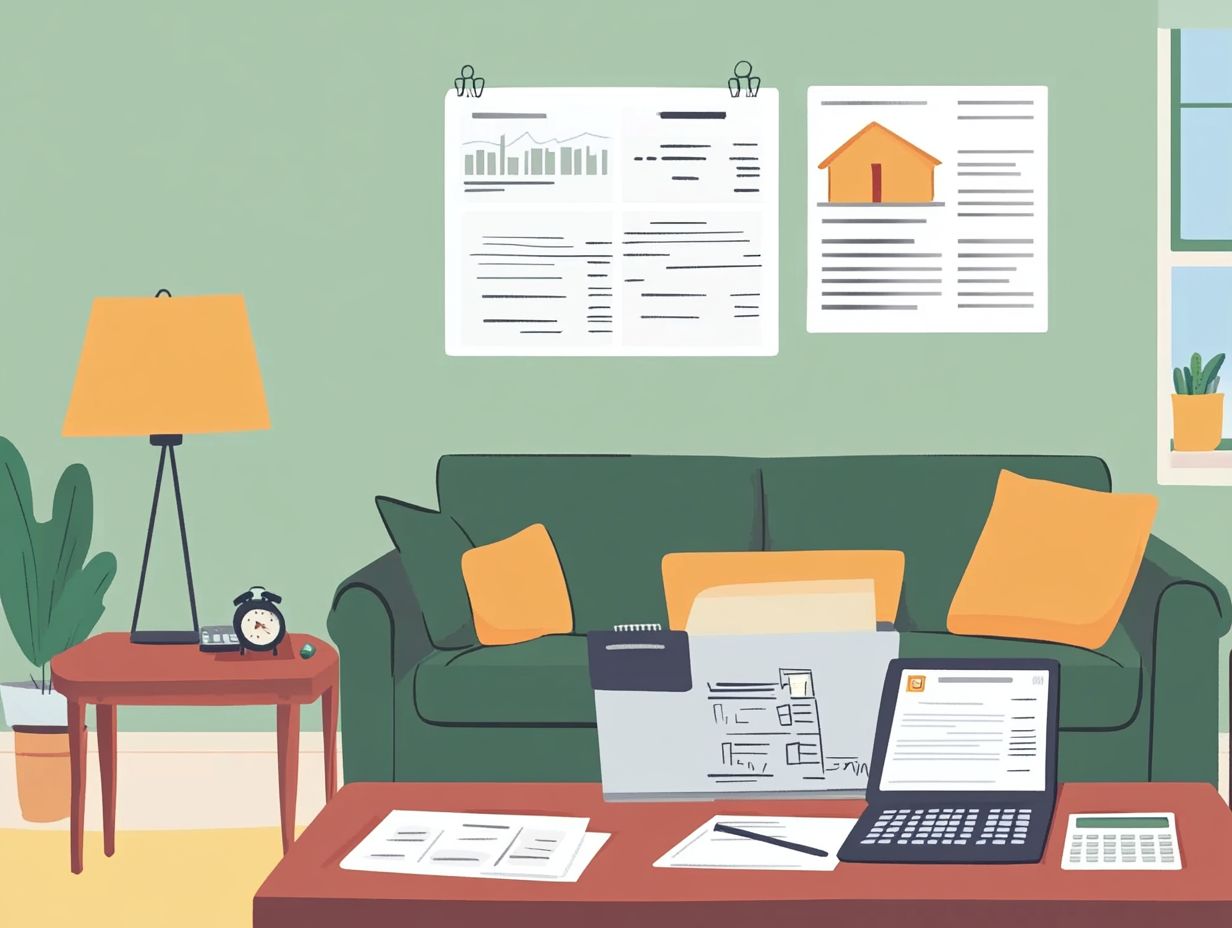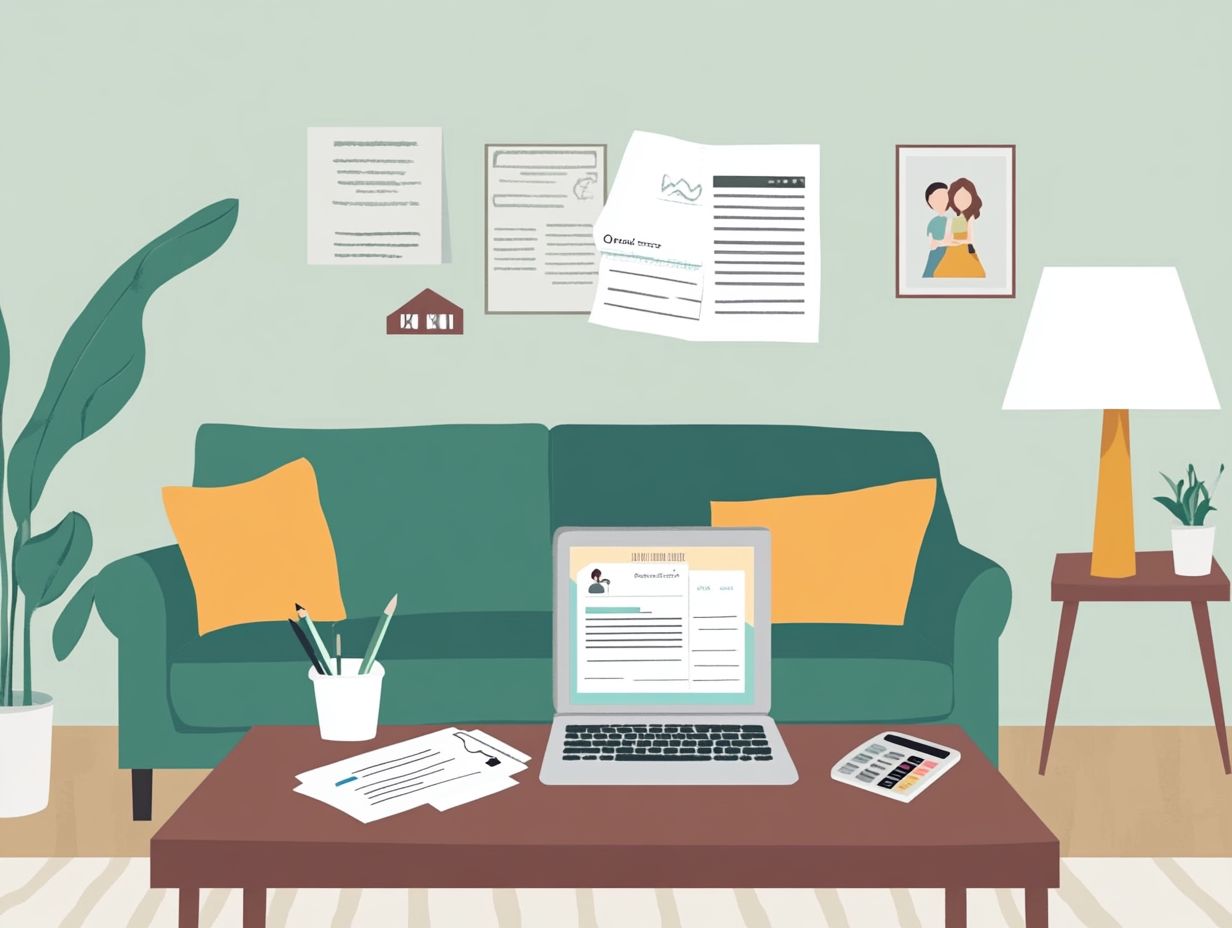How Does Home Insurance Affect Your Mortgage?
Navigating the world of home insurance can feel overwhelming, particularly for first-time homeowners. This article distills the essentials of home insurance and sheds light on its vital role in the mortgage process. It also explains why lenders insist upon it and how home insurance influences mortgage payments and closing costs. This empowers you to make informed decisions.
You will also find valuable tips on selecting the right policy and saving on premiums. Understanding these factors can pave the way for greater financial security and lasting peace of mind.
Contents
Key Takeaways:

Home insurance is your safety net, crucial for securing a mortgage as lenders typically require it to protect their investment. It affects your mortgage in terms of monthly payments and closing costs, so choosing a policy that fits your budget is essential. Consider coverage, deductibles (the amount you pay out of pocket before insurance kicks in), and discounts when selecting home insurance. To understand more about the role of home insurance in mortgages, explore ways to save on premiums to potentially lower your mortgage costs.
Understanding Home Insurance
Understanding home insurance is essential for homeowners. It safeguards your investment while delivering peace of mind in the face of unexpected events like natural disasters.
Homeowners insurance typically includes various types of coverage, including property insurance, liability protection, and additional living expenses. This creates a robust shield against potential risks.
As you explore homeowners policies, familiarize yourself with the different insurance options available. Understand the importance of insurance premiums and how insurance companies can provide tailored coverage that aligns with your specific needs.
What is Home Insurance?
Home insurance, often known as a homeowners policy, provides financial protection against various risks tied to homeownership. This includes everything from damage caused by natural disasters to theft and liability claims.
Your policy typically includes several critical components. Dwelling coverage shields the physical structure of your home, while personal property coverage safeguards your belongings inside. Liability coverage is also critical; it helps manage costs related to injuries that occur on your property.
There are various types of coverage available, such as actual cash value or replacement cost options. These give you the power to choose what aligns best with your needs. By understanding these components, you can select the right insurance coverage tailored to your circumstances, ultimately protecting your investment and granting you peace of mind.
Importance of Home Insurance for Mortgage

The significance of home insurance for mortgage holders cannot be overstated. Mortgage lenders usually mandate homeowners insurance as a condition of the mortgage agreement. This safeguards the property against potential losses that could affect your mortgage payments and the overall financial responsibilities tied to homeownership.
This requirement acts as a protective measure for both you and the lender. It ensures that your investment remains secure against risks like natural disasters or theft.
Why Lenders Require Home Insurance
Lenders require homeowners insurance to mitigate their risk because they have a vested interest in protecting their investment. Ensuring that the property is safeguarded from damage helps shield their financial commitment and supports you in maintaining your mortgage payments.
This requirement is rooted in the financial implications of potential disasters that could threaten the value of your home and the lender’s security. When you have adequate coverage, you’re not only protecting your property from unexpected events but also providing reassurance to the lender that their investment remains secure.
Without sufficient homeowners insurance, you and the lender could face serious financial repercussions. If a disaster strikes, you might struggle to cover repairs or replacements out of pocket, leading to missed mortgage payments and an increased risk of foreclosure.
In this light, having proper coverage transcends mere precaution; it becomes a mutual safeguard that benefits both you and the lender.
How Home Insurance Affects Your Mortgage
Home insurance plays a crucial role in your mortgage journey. It influences your monthly mortgage payment, insurance premiums, and overall costs, including how home improvements affect your insurance coverage.
Understanding the connection between your insurance coverage and financial responsibilities is essential. This knowledge can significantly impact your well-being as a homeowner.
Impact on Mortgage Payments

Homeowners insurance significantly impacts your mortgage payments. Understanding the role of home insurance in home buying is crucial, as insurance premiums are often bundled into your monthly mortgage payment through an escrow account.
Lenders require this insurance coverage to protect their investment, integrating these costs into the mortgage structure.
When calculating homeowners insurance premiums, several factors come into play. These include the property’s location, size, and your claims history.
Any increase in premiums raises your mortgage expenses. This, in turn, affects your budgeting and financial planning.
By understanding these dynamics, you can manage your overall housing costs and make informed decisions about your escrow accounts.
Effects on Closing Costs
Homeowners insurance can also influence your closing costs. Mortgage lenders typically require proof of insurance before finalizing the loan agreement.
Lenders often expect you to prepay a portion of the insurance premium at closing. This requirement can increase the total amount needed on that day.
This upfront payment boosts your immediate cash needs and highlights the importance of selecting a coverage plan that meets lender specifications.
Don t forget to factor in the annual premium of your homeowners insurance policy into your long-term budgeting. It impacts your monthly mortgage payment and overall affordability.
Understanding how these requirements affect closing costs helps you prepare your financial plans for a smoother transition into homeownership.
Choosing the Right Home Insurance
Choosing the right home insurance is essential for homeowners. It ensures you have enough coverage tailored to your unique needs.
This process involves evaluating different insurance types and understanding rates. Look for any available discounts to enhance your protection.
Factors to Consider

When selecting home insurance, several factors are crucial. These include the range of options, coverage limits, and discounts tied to features like home security systems.
Evaluate each aspect carefully to find a policy that aligns with your needs. For example, consider actual cash value, which is the current value of your home, and replacement cost, which is the amount needed to rebuild your home without depreciation.
Understanding coverage limits is essential. Under-insuring your home may lead to significant out-of-pocket expenses in case of a disaster.
You may also discover various discounts, such as those for bundling policies or installing security systems, which can significantly lower your premiums.
By weighing these factors thoughtfully, you can secure optimal protection while managing costs effectively.
Tips for Saving on Home Insurance
Finding ways to save on home insurance can lead to substantial reductions in your premiums. Homeowners can achieve this by exploring available insurance discounts.
Enhance your home s security or implement strategic improvements to elevate your property s value and safety.
Take charge of your home insurance today and discover fantastic savings!
Ways to Lower Premiums
Ready to save money? You have several effective strategies to lower your insurance premiums.
Start by shopping around for competitive rates. Comparing quotes can lead to significant savings!
Invest in safety tools like smoke detectors and security alarms. These features can also qualify you for discounts.
Consider bundling different types of insurance, like home and auto, to maximize your savings. Bundling means getting various types of insurance from the same company.
Don’t forget to regularly check your coverage. Look for options that minimize costs while still giving you the protection you need.


